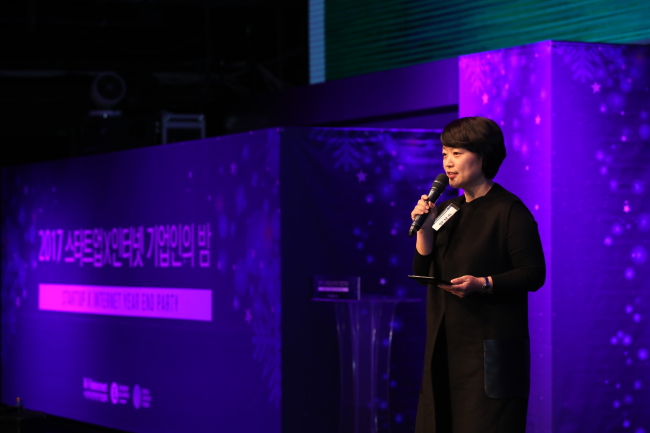Naver CEO pledges to improve communication between IT sector, government
By Sohn Ji-youngPublished : Dec. 6, 2017 - 15:43
Naver CEO Han Seong-sook pledged Tuesday to improve understanding and communication between the internet technology sector and the South Korean government in 2018, reflecting on the hardships that have hit the local IT industry this year.
“The year 2017 was a difficult one filled with many hardships and regulatory issues that impacted the general IT industry, including internet companies, startups and game companies alike,” Han said during the 2017 Startup x Internet Corporations Night event in Seoul.
“The year 2017 was a difficult one filled with many hardships and regulatory issues that impacted the general IT industry, including internet companies, startups and game companies alike,” Han said during the 2017 Startup x Internet Corporations Night event in Seoul.

Han was speaking as the chairman of the Korea Internet Corporations Association and as the chief of Naver, which dominates Korea’s internet business landscape as the operator of the country’s biggest web portal and search engine.
From the issue of adopting equal regulations for local and foreign internet companies to ownership of data traffic costs, creating fair business environment for all businesses and taxes, many regulatory hurdles in the IT business space were spotlighted this year, Han said, adding that they will become even bigger problems in the future.
Reflecting on the year, Han said she has realized the IT industry has not been successful in communicating its stance to external players, including government regulators, and pledged to improve this situation next year.
“Next year will be devoted to forging a productive dialogue between IT businesses and those on the outside.”
Han’s remarks came as IT companies, most notably Naver, have been at the center of the public’s attention for its growing influence over society and calls for measures that can properly regulate, yet not weigh down, businesses in the sector.
The portal website operator was scrutinized during this year’s parliamentary audit for its monopoly over Korea’s internet ecosystem that critics claim gives the portal uncontested control over the web search and advertisement.
Naver also faced heavy criticism for rigging its news display platform to control what type of news it does or does not show, raising concerns over the transparency of the portal that dominates nearly 70 percent of Korea’s news and media search space.
The issue of “fair competition” in the Korean IT sector was also raised, with Naver publicly attacking foreign rival Google for refusing to reveal how much profit it generates and how much tax it pays in Korea.
In doing so, Naver exposed the issue of how Korean and foreign IT firms are subject to differing regulatory standards and obligations, though their business areas overlap.
Web traffic costs also erupted as a major issue for the industry this year, as Facebook and Korean network provider SK Broadband began a dispute on who should pay for the costs of building and maintaining a cache server that can diffuse the heavy traffic generated by Facebook’s services here.
Meanwhile, the ICT-based startup community continues to fight for flexible regulations that allow new technologies and innovate business models to launch in the Korean market.
For instance, local car sharing service operator Poolus is engulfed in a legal battle with the Seoul Metropolitan Government over the legality of operating its service around the clock instead of during selected “commuting hours.”
According to the “Startup Korea!” report released by McKinsey & Company this year, 70 percent of the world’s top 100 startups that had raised the most in investment in 2016, including Uber, Airbnb and Ant Financial, would find their business models illegal or noncompliant with Korea’s local regulations.
By Sohn Ji-young (jys@heraldcorp.com)


![[Exclusive] Korean military set to ban iPhones over 'security' concerns](http://res.heraldm.com/phpwas/restmb_idxmake.php?idx=644&simg=/content/image/2024/04/23/20240423050599_0.jpg&u=20240423183955)

![[Graphic News] 77% of young Koreans still financially dependent](http://res.heraldm.com/phpwas/restmb_idxmake.php?idx=644&simg=/content/image/2024/04/22/20240422050762_0.gif&u=)



![[Pressure points] Leggings in public: Fashion statement or social faux pas?](http://res.heraldm.com/phpwas/restmb_idxmake.php?idx=644&simg=/content/image/2024/04/23/20240423050669_0.jpg&u=)









